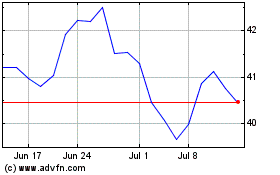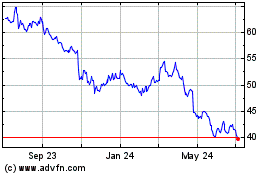FDA Approves Bristol-Myers's Yervoy, Opdivo for Treatment of Melanoma -- Update
October 01 2015 - 4:44PM
Dow Jones News
By Peter Loftus and Ron Winslow
The U.S. Food and Drug Administration approved the first therapy
combining two cutting-edge cancer drugs that unleash the body's
immune system against tumors--a combination that will cost more
than $250,000 per patient for the first full year, according to its
manufacturer.
Bristol-Myers Squibb Co. said Thursday the FDA approved the use
of its drugs Yervoy and Opdivo for the treatment of advanced
melanoma, a deadly form of skin cancer. Each immunotherapy
previously was approved individually to treat melanoma; they work
by different mechanisms to fight tumors.
The hefty price tag underscores a dilemma amid progress in
cancer care: oncologists believe combinations of newer therapies
have potential to improve treatment versus single-drug therapies,
but the costs could strain health-care budgets as the cocktails are
deployed against multiple cancer types. Bristol-Myers also is
studying its Yervoy-Opdivo combination in lung cancer, which has a
bigger patient population than melanoma.
"What we don't want to see is that cost becomes a factor in
people getting the best kind of care that's available," said Tim
Turnham, executive director of the nonprofit Melanoma Research
Foundation.
He said it is difficult to assess whether the cost of the
Bristol-Myers combination is justifiable because the magnitude of
the treatment's benefit on patient survival isn't yet known. So
far, studies have shown that it shrinks tumors and delays the time
until either tumor progression or death compared with its component
drugs alone.
A Bristol-Myers spokeswoman said "long-term survival, which is
ultimately our goal and that of patients, should be given
appropriate and significant consideration in assessing value." She
added that only patients who continue to respond to the therapy
stay on treatment.
Other expensive combinations have also hit the market. A
two-drug melanoma regimen from Novartis AG costs about $18,869 for
a 30-day supply, or roughly $226,428 per patient if taken for a
year. A Novartis spokeswoman said studies have shown the
combination prolongs patient survival.
The FDA based its approval of the Yervoy-Opdivo combination on a
Bristol-funded study that showed the regimen significantly shrank
tumors in 60% of melanoma patients, versus 11% of patients
receiving Yervoy alone. The median time from start of treatment
until disease progression or death--also known as progression-free
survival--was 8.9 months among those receiving the combination,
versus 4.7 months in the Yervoy-alone group.
"It is the first example of an immuno-oncology treatment that
could produce an objective (tumor) response in the majority of
patients," said Jedd Wolchok, chief of melanoma and immunotherapies
service at Memorial Sloan Kettering Cancer Center, New York, and a
leader of several studies of the combined treatments.
The combination also increased the risk of serious adverse
events such as the gastrointestinal disorder colitis.
Dr. Wolchok said oncologists in community practices may need
some education in managing the side effects, which are different
from those resulting from chemotherapy and other cancer drugs. The
new combination requires oncologists and nurses "to pay attention
to toxicity so it can be reversed quickly," said Dr. Wolchok, who
is a consultant for Bristol-Myers and whose institution gets grant
support from the company.
A patient receiving the combination therapy takes both drugs for
the first 12 weeks and then Yervoy treatment is stopped. The
patient continues taking Opdivo until experiencing disease
progression or unacceptable toxicity. The cost for the initial
12-week phase of the combination is about $141,000, and then
$12,500 a month for Opdivo alone, totaling roughly $256,000 if a
patient stays on therapy for a year, according to a Bristol-Myers
spokeswoman. Subsequent full-year costs of therapy would be about
$150,000 for Opdivo alone.
Yervoy, which was introduced in 2011, generated $621 million in
sales for Bristol in the first half of this year. Opdivo, launched
late last year, had $162 million in sales for the same period.
Write to Peter Loftus at peter.loftus@wsj.com and Ron Winslow at
ron.winslow@wsj.com
Subscribe to WSJ: http://online.wsj.com?mod=djnwires
(END) Dow Jones Newswires
October 01, 2015 16:29 ET (20:29 GMT)
Copyright (c) 2015 Dow Jones & Company, Inc.
Bristol Myers Squibb (NYSE:BMY)
Historical Stock Chart
From Mar 2024 to Apr 2024

Bristol Myers Squibb (NYSE:BMY)
Historical Stock Chart
From Apr 2023 to Apr 2024
